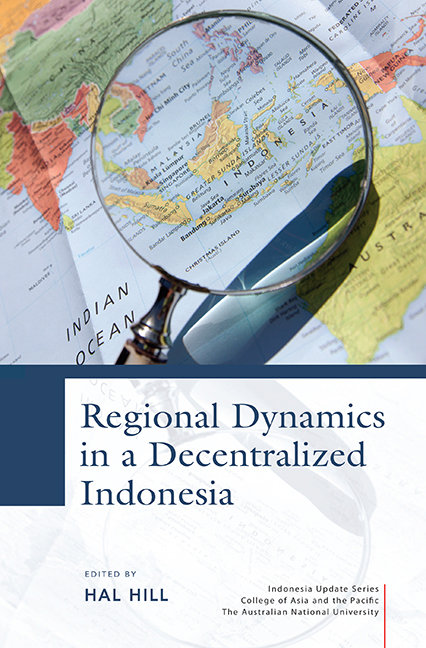Book contents
- Frontmatter
- Dedication
- Contents
- Tables
- Figures
- Contributors
- Acknowledgments
- Glossary
- Map of Indonesia
- 1 An introduction to the issues
- PART 1 HISTORICAL, ECONOMIC, POLITICAL AND SOCIAL PATTERNS
- PART 2 DECENTRALIZATION AND GOVERNANCE
- 6 Twelve years of fiscal decentralization: a balance sheet
- 7 Local governance and development outcomes
- 8 Decentralization, governance and public service delivery
- 9 What determines the quality of subnational economic governance? Comparing Indonesia and Vietnam
- PART 3 LOCAL-LEVEL PERSPECTIVES
- PART 4 MIGRATION, CITIES AND CONNECTIVITY
- PART 5 CHALLENGES FOR INDONESIA'S PERIPHERY
- Author index
- Subject index
- INDONESIA UPDATE SERIES
6 - Twelve years of fiscal decentralization: a balance sheet
from PART 2 - DECENTRALIZATION AND GOVERNANCE
Published online by Cambridge University Press: 21 October 2015
- Frontmatter
- Dedication
- Contents
- Tables
- Figures
- Contributors
- Acknowledgments
- Glossary
- Map of Indonesia
- 1 An introduction to the issues
- PART 1 HISTORICAL, ECONOMIC, POLITICAL AND SOCIAL PATTERNS
- PART 2 DECENTRALIZATION AND GOVERNANCE
- 6 Twelve years of fiscal decentralization: a balance sheet
- 7 Local governance and development outcomes
- 8 Decentralization, governance and public service delivery
- 9 What determines the quality of subnational economic governance? Comparing Indonesia and Vietnam
- PART 3 LOCAL-LEVEL PERSPECTIVES
- PART 4 MIGRATION, CITIES AND CONNECTIVITY
- PART 5 CHALLENGES FOR INDONESIA'S PERIPHERY
- Author index
- Subject index
- INDONESIA UPDATE SERIES
Summary
INTRODUCTION
The prevailing view among many policy makers, policy advisers and other interested observers in Indonesia is that decentralization has been somewhat of a disappointment. This assessment derives from the observation that local public service delivery has improved little, if at all, since the government began implementing its regional autonomy program in 2001, despite an apparently significant transfer of funds to provinces and districts to discharge their newfound responsibilities. A number of theories have been put forth to explain the seemingly meagre results of decentralization, each with its own set of policy reform prescriptions.
The main intent of this chapter is to review the experience with decentralization since 2001, to critically assess various explanations for the failure of regional autonomy to significantly improve local services and to gauge the prospects for reform going forward. First, the chapter provides a brief review of the history of fiscal decentralization in Indonesia (section 6.2). Next, it examines some of the empirical evidence on decentralized service delivery outcomes (section 6.3). It then discusses and appraises the standard rationales for poor service outcomes (section 6.4). In section 6.5, the chapter offers an alternative explanation for inadequate decentralized service delivery, and in section 6.6 it evaluates the near-term policy reform agenda for decentralization. The chapter concludes with a consideration of the likelihood of successful reform.
A BRIEF HISTORY OF FISCAL DECENTRALIZATION
Indonesia is a unitary country comprising central, provincial and local levels of government. Until 2001, the regional administration of public affairs operated through a hierarchical, multi-tiered and parallel system of deconcentrated central government agencies and nominally autonomous subnational units.1 Throughout most of its history, Indonesia's public sector was counted among the most centralized in the world (Smoke and Lewis 1996; Lewis and Smoke 1998).
Many observers would date Indonesia's modern administrative and fiscal decentralization program to Law 5/1974 on Basic Principles on Administration in the Regions. This legislation did indeed provide a basis for greater involvement of decentralized subnational governments in the provision of those public services that existed at the time. In the early 1990s some implementing regulations were written and a pilot program for regional autonomy was undertaken, but little real progress was made in operationalizing the general principles outlined in the early law over the succeeding 25 years (Brodjonegoro and Asanuma 2000; Lewis 2002b).
- Type
- Chapter
- Information
- Regional Dynamics in a Decentralized Indonesia , pp. 135 - 155Publisher: ISEAS–Yusof Ishak InstitutePrint publication year: 2014

